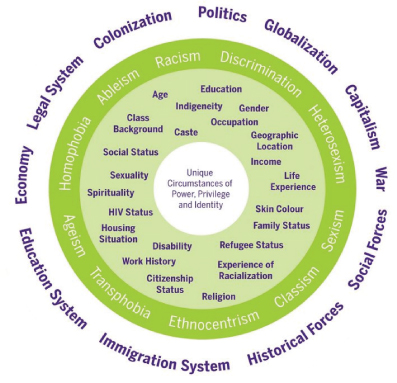Welcome to Diversity Essential’s Justice, Equity, Diversity and Inclusion (JEDI) Essentials section. All workshops are tailored to fit the needs of participants and are delivered incorporating diverse pedagogical learning styles. This can include: didactic delivery, interactive activities, individual, small and large group processing, social media, problem-solving, and case scenarios.

Introductory to Justice, Equity, Diversity and Inclusion
This workshop invites participants to broaden their awareness and knowledge about the differences between representation, diversity, equity and inclusion, their intersections, and how participants can become agents of social change in their cultures and environments. Participants will be encouraged to think more critically about what lies unseen within representation, identify implicit or unconscious bias, and acquire the principles of inclusive leadership. Content can include:
- Differentiating representation from diversity
- Describing the differences between awareness, acceptance and inclusion
- Identifying direct forms of discrimination and systemic discrimination
- Discussing why explicit naming of identities are important
- Tools that foster inclusion and belonging
Intersectionality and Intersecting Identities
Coined by Kimberlé Crenshaw in 1989, intersectionality informs inequities and privileges that people experience based on multiple identity markers and positionality. Understanding intersectionality helps to broaden our awareness of how the sum of our (multiple) identity parts shapes our social and cultural experiences and access to resources. This in turn can have implications on policy guidelines and practices, research, and community engagement.
This workshop is an introduction to intersectional awareness with participants engaging in discussions about: gender, race and racialization, orientation, age, class, ability, etc. Participants will also explore what it means to hold multiple identities and how multiple identities inform relationships, decision making and access to resources.
Unpacking Systemic Oppression, Allyship, and Privilege 101
This introductory workshop is intended for those interested in learning, unpacking, and processing matters regarding equity, oppression, and social justice, and who wish to deepen their understanding of the implications of privilege. This session is designed for service providers, educators, clinicians, and people working in education, health and social policy. People from all stages of their career are welcome. This session can include the following components:
- Describing how the legacies of colonialism play a key role in determining systemic and social privileges
- Identify how an equitable, inclusive and an anti-oppression framework can be adapted in policy and practice
- Describe intersectionality and why intersectional awareness matters in education, social services and healthcare
- Describe the tenets of allyship vs. performative allyship
- Apply the concepts of allyship to one’s own work
- Describe and critique the concept of ‘safe space’
